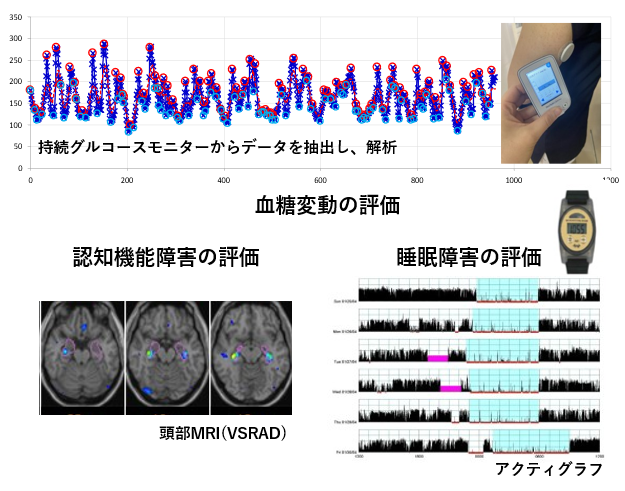A multicenter collaborative study on the relationship between blood glucose fluctuations, including hypoglycemia, and diabetic complications in diabetic patients (Hyogo Diabetes Hypoglycemia Cognition Complications study: HDHCC study)
情報更新日 2025年12月26日
- Seeds Information
- Researcher Information
- What do you expect from collaboration with companies?
- Contact for this research
Seeds Information
keyword
Sleep quality, metabolism, cognitive function, autonomic nervous system
Field
Research related to lifestyle-related diseases and cardiovascular risk factors
Overview
本研究は、糖尿病をはじめとした動脈硬化性疾患のリスク因子を有する症例を対象とし、認知機能障害、糖尿病細小血管合併症、心血管疾患の発症・進展に関連する要因について明らかにすることを目的とした多施設共同のコホート研究です。
2018年の開始から2025年9月時点で597名が登録され、現在も新規の症例登録と追跡を並行して行っております。
本研究では、持続グルコースモニター(CGM)を用いた血糖管理指標の評価をはじめ、腕時計型加速度計を用いた睡眠状況の評価、腸内細菌叢とその代謝産物の評価、認知機能スコアおよび頭部MRIをはじめとした脳画像マーカーの評価を行い、これらの関連について追跡調査を行っています。
これまでに、CGM由来の血糖管理指標の解析を中心に進めており、CGM指標と従来からのHbA1cなどの血糖管理指標との関連(1)、高齢糖尿病における低血糖リスクの高い糖尿病治療薬の使用と低血糖指標との関連(2)、炭水化物摂取比率と高血糖指標との関連(3)などについて明らかにしてまいりました。
さらに、CGM指標と糖尿病合併症および併存症との関わりについて解析をすすめており、CGM指標の悪化は糖尿病関連腎臓病(4)、大脳白質病変の重症度(5)、経時的な認知機能低下(6)と関連することを明らかにしてまいりました。
今後は、血糖管理のみならず、睡眠障害や腸内細菌叢と糖尿病細小血管合併症、認知機能障害、心血管疾患の発症・進展との関連について検討を進めていく予定です。
What's new?
It is assumed that deterioration of glycemic control, sleep disorders, and cognitive impairment have a negative effect on each other, but there are few prospective studies that focus on this interrelationship.
What are its advantages over other studies?
This study is original in that it comprehensively evaluates and tracks blood glucose fluctuations, sleep quality, cognitive impairment, and atherosclerotic disease.
What problem does it help solve?
It has been reported that sleep disorders are associated not only with diabetes and arteriosclerotic diseases, but also with cognitive impairment, and countermeasures against these disorders are a challenge.
It is hoped that this research will lead to the discovery of new target molecules related to the prevention and diagnosis of cognitive decline.
Possibility of other applications and developments
Similar analyses can be performed in patients without diabetes.
Sub-analyses include analysis of predictive factors such as brain volume, ischemia, cerebral blood flow, and amyloid accumulation.
Related Patents
―
Related papers
- Ohigashi M et al: J Diabetes Investig. 2021, 12:940-949
- Kuroda N, et al. J Diabetes Investig. 2021, 12: 244-253
- Osugi K, et al. J Diabetes Investig. 2023, 14: 659-668
- Takagi A, et al. Acta Diabetol. 2024, 61: 413-423
- Inoue C, et al. BMJ Open Diabetes Res Care. 2024, 12: e003744
- Inoue M, et al. Diabetes Obes Metab. 2025, 27: 4737-4746
Researcher Information
| full name | Hidenori Koyama |
|---|---|
| Affiliation | School of Medicine Department of Diabetes Endocrinology and Clinical Immunology |
| Specialization | Research related to lifestyle-related diseases and cardiovascular risk factors |
| Collaborative Researcher | 楠 宜樹、小西 康輔、大東 真菜、井上 真希、井上 智香子、玉井 宏介 |
| Related links | Laboratory website |
What do you expect from collaboration with companies?
Various collaborative research projects are anticipated, including the discovery of new biomarkers related to the onset and progression of cardiovascular complications, including arteriosclerosis, and dementia functional disorders, as well as the development of new diagnostic and treatment devices.
Contact for this research
兵庫医科大学 大学事務部 研究推進課
E-mail: chizai@hyo-med.ac.jp
Tel: 0798-45-6488

 Research Seeds Collection
Research Seeds Collection
